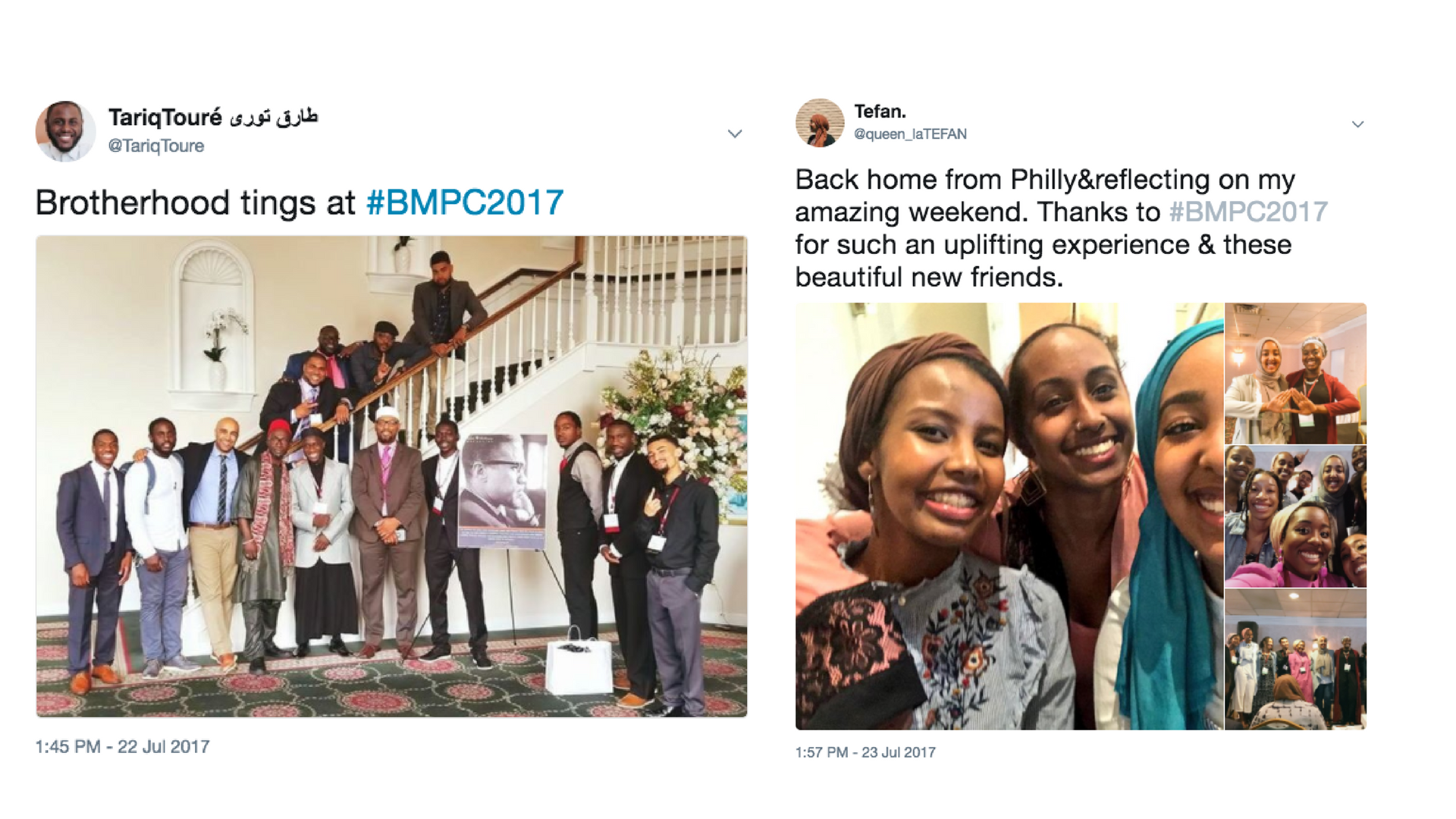
Images: https://twitter.com/queen_laTEFAN/status/889182764943015936; https://twitter.com/TariqToure/status/888817276052533248
Black Muslim Psychology Conference: On Islamophobia and Anti-Blackness
On July 21-22, 2017, the Muslim Wellness Foundation organized the 3rd Annual Black Muslim Psychology Conference (BMPC). This year’s theme was “Leading with Compassion.” The conference “explored the role of leaders in facilitating community healing” in the “post-9/11 and post-Ferguson era.” Moreover, the BMPC addressed how “racism, Islamophobia, systemic oppression as well as daily microaggressions impact the emotional well-being of the largest racial group within the American Muslim community “ Black Muslims.”
Our Beloved Ancestors: Reflections of the Life & Legacy of Minister Jeremiah Shabazz & Sister Clara Muhammad
In one workshop, the descendants of leaders of the Nation of Islam (NOI) reflected on the life and legacy of their respective families and their impact on Black Muslim communities in the U.S. One of the panelists was Laila Muhammad, the daughter of W.D. Muhammad (1933-2008) and granddaughter of the Honorable Elijah Muhammad and Sister Clara Muhammad.
After the death of his father, W.D. Muhammad transitioned the theology of the Nation to Sunni Islam. The Honorable Elijah Muhammad (1897-1975) was the leader of NOI from 1934 until his death. Among the Honorable Elijah Muhammad’s mentors were Malcolm X and Muhammad Ali. Sister Clara Muhammad (1899-1972), known as the “First Lady of the Nation of Islam,” spearheaded the establishment of independent primary and secondary schools across the country, among many other initiatives.
Another panelist was Dr. Safiyya Shabazz, the daughter of Minister Jeremiah Shabazz. Minister Shabazz was the leader of Mosque No. 12 in Philadelphia and traveled frequently with Muhammad Ali.

Dr. Shabazz told the audience about her father and his conversion to Islam. She believes that Minister Shabazz joined the Nation of Islam in 1953. The reason she knows this, she said, is due to FBI records on her father “ surveillance by state and law enforcement agencies of Muslims was taking place long before 9/11. She also discussed how her father was dishonorably discharged from the U.S. Army and let go from his government job as a result of his membership in the Nation.
Young, Gifted & Black: Black Muslim Collegiate Forum

A panel of a dozen Black Muslim college students discussed what it’s like being Black and Muslim in U.S. universities today. The responses were unanimous “ being a Muslim university student is challenging, but being a Black Muslim university student is significantly more challenging. The students explained that this is a result of living in the margins of two communities, and never feeling that they fully belong to either. Multiple marginalized identities “ such as being Muslim and being Black “ compound discrimination.
The Somali American Experience: Intersections of Anti-Blackness, Islamophobia, Xenophobia and Poverty
Another panel at the BMPC addressed the experiences of Somali Americans, exploring the intersections of anti-Blackness, Islamophobia, xenophobia and poverty. The panelists discussed the impact of derisive popular media representations of Somalis in Hollywood films like Black Hawk Down and Captain Phillips; countering violent extremism (CVE) programs in Somali communities; comments made by Donald Trump while on the campaign trail about Somalis; and President Trump’s Travel Ban, which lists Somalia in addition to five other Muslim-majority countries.

In August 2016 while campaigning in Maine, Trump cited the settlement of Somalis in Maine. He said, “We’re letting people come in from terrorist nations that shouldn’t be allowed. This could be the great Trojan horse of all time.”
In November 2016, just two days before the general presidential election, Trump delivered a speech in Minnesota in which he called Somali immigrants a “disaster” for Minnesota. He said,
Here in Minnesota, you’ve seen first-hand the problems caused with faulty refugee vetting, with very large numbers of Somali refugees coming into your state without your knowledge, without your support or approval. Some of them [are] joining Isis and spreading their extremist views all over our country and all over the world.
The panelists also discussed CVE programs and immigration policies that have targeted Somali communities. According to federal immigration data for the first eight months of the current fiscal year, 260 Somalis have been deported. By way of comparison, 198 Somali people were deported in the entire 2016 fiscal year. Most were failed asylum seekers. Furthermore, while only 7% of all immigrants to the United States are Black (African, Caribbean) immigrants, Black immigrants face disparate rates of deportation and detention compared to non-Black immigrants.
Additionally, the panelists drove home, it is worth recognizing that half of the countries listed in President Trump’s Travel Ban executive order, otherwise known as the Muslim Ban, are countries located in Africa. Moreover, two of those countries are Black Arab or Black African-majority countries “ Somalia and Sudan.
In countering Islamophobia, one must ask whether Islamophobia can be reduced solely to Muslim identity. Being Muslim is not a monolithic experience; rather, it is far more complex, multifaceted and intersectional. Moreover, the question of who is imagined as Muslim today deserves critical examination. To that end, Dr. Su’ad Abdul Khabeer, author of Muslim Cool: Race, Religion, and Hip Hop in the United States, posed a compelling question in a recent op-ed: “Are Black Muslims the new (old) face of Islam?” The answer is not a simple one, but it opens the door for more critical engagement and nuance around Islam, Muslims and Islamophobia today.

 Search
Search